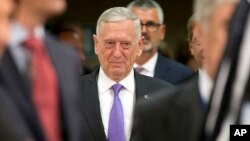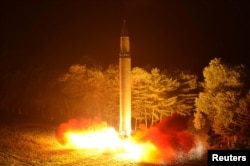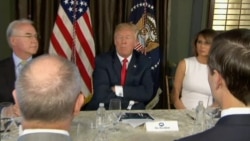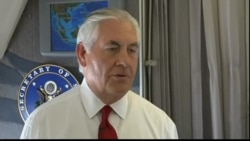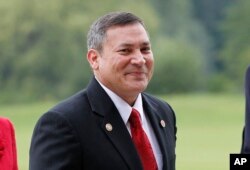U.S. Defense Secretary Jim Mattis said Wednesday that North Korea risks annihilation if it starts a war, and he told Pyongyang it must end its pursuit of nuclear weaponry.
Mattis said North Korea "should cease any consideration of actions that would lead to the end of its regime and the destruction of its people." The reclusive communist nation, he added, "must choose to stop isolating itself and stand down its pursuit of nuclear weapons."
Mattis, whose remarks came in a statement, warned that the U.S. and its allies "now possess the most precise, rehearsed and robust defensive and offensive capabilities on Earth." He said any North Korean military operation "will continue to be grossly overmatched by ours and would lose any arms race or conflict it initiates."
Mattis, a retired Marine Corps general, spoke out after President Donald Trump, in the midst of an exchange of bellicose threats with North Korea, declared that the United States nuclear arsenal "is now far stronger and more powerful than ever before."
In an early-morning Twitter comment, Trump said his first order as president after taking office in January "was to renovate and modernize our nuclear arsenal." He added he was hopeful that "we will never have to use this power, but there will never be a time that we are not the most powerful nation in the world!"
It was not immediately clear what overhaul of the country's nuclear weaponry Trump was referencing. The president has called for a big increase in military spending, including research and development of new weapons, but Congress has yet to enact a 2018 spending plan.
WATCH: Trump: Pyongyang 'Best Not Make Any More Threats'
'Fire and fury'
Trump's latest assessment of the country's potent military strength came less than a day after he issued a stark warning to North Korea. If Pyongyang continues its threats against the United States, the president declared, "they will be met with fire and fury like the world has never seen."
Some critics have questioned the vehemence of Trump's "fire and fury" remarks. White House aides said Wednesday that the words were improvised by the president before he spoke to reporters late Tuesday at his vacation home in New Jersey, but they emphasized that the president's comment certainly reflected the tone he meant to convey to North Korea.
Before Trump spoke out, White House press secretary Sarah Huckabee Sanders said White House Chief of Staff John Kelly and members of the president's National Security Council were clear that he "was going to respond to North Korea's threats ... with a strong message in no uncertain terms."
However, the top U.S. diplomat, Secretary of State Rex Tillerson, sought to downplay the threats Pyongyang and Trump leveled at each other following last week's unanimous vote by the U.N. Security Council to impose new, more stringent sanctions on North Korea. The new penalties are intended to reduce Pyongyang's income from exported goods and labor by at least $1 billion — one-third of its current annual earnings — and thus force an end to its nuclear weapons development.
On a refueling layover in Guam as he returned to Washington from a trip through Southeast Asia, Tillerson said, "I think Americans should sleep well at night and have no concerns about this particular rhetoric of the last few days." Tillerson added that Trump, as commander in chief, "felt it necessary to issue a very strong statement directly to North Korea."
WATCH: Tillerson: Trump's Message to North Korea is Language Kim Jong Un Would Understand
Reaffirming US capability
The secretary of state continued: "I think what the president was just reaffirming is that the United States has capability to fully defend itself in any attack and defend our allies. And we will do so. And so, the American people should sleep well at night."
Tillerson said Trump's rhetoric was intended for North Korean leader Kim Jong Un, in words he "would understand, because he does not seem to understand diplomatic language."
North Korea said earlier Wednesday that its armed forces were "carefully examining" a plan to launch missile strikes against Guam. American military bases on the U.S. Pacific island territory are thought to hold the largest U.S. arsenal of nuclear weapons outside the continental United States.
Tillerson said he never considered rerouting his jet's refueling stop. "I do not believe that there is any imminent threat, in my own view," Tillerson said.
The governor of Guam, Eddie Calvo, said authorities there were "prepared for any eventuality" but did not feel they were under threat. "Guam is American soil ... not just a military installation," Calvo added, and noted that he had been assured by the White House that any attack on the island would be considered an attack on the United States.
Tillerson said he hoped the U.N. sanctions and the world community, including China and Russia, "can begin to persuade [North Korea] that they need to reconsider the current pathway they're on and think about engaging in a dialogue about a different future."
VOA's Steve Herman, Margaret Besheer and Carla Babb contributed to this report.




